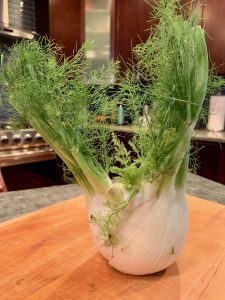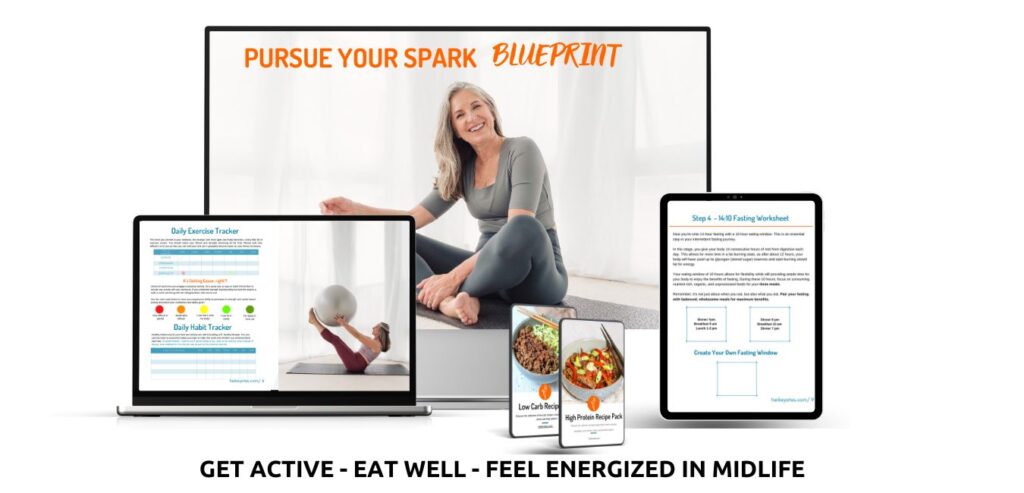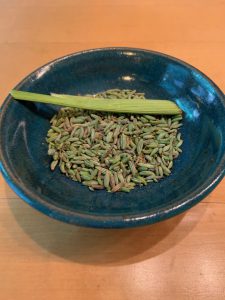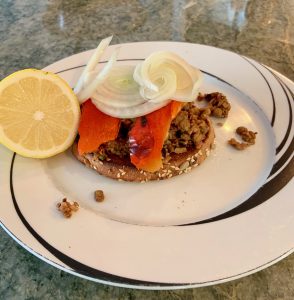Health isn’t all about 6-pack abs and beautifully sweet seasonal fruit; sometimes, taking the right steps towards your health can mean some hard-hitting habit-changing steps that you wouldn’t think of. Truth be told I use to hate Fennel. The herb with thick light green stalks and a taste similar to anise was a nightmare. I wanted to run away when my mom offered me fennel tea as a small sick child.
As we age things change, this past year, after months of symptoms of cramps, bloating, diarrhea, and trying to heal me through natural foods, I had to see my doctor. I was diagnosed with microscopic colitis (inflammation of the large intestine), but he couldn’t offer any solutions other than bottle upon bottle of Pepto Bismol. So I set out to find my longer-term solutions. The top 7 benefits of eating fennel or drinking fennel tea in midlife are undeniable.
The diagnosis set my health journey on a new detour, and my acupuncturist assisted in my gut healing, while also advising me to quit coffee and replace it with my childhood nemesis, fennel tea. After months of heeding her advice, it helped me to side with Fennel and its ability to help heal my body from the inside out. My symptoms are now under control, and in addition to the tea, I include fennel seeds in meals as well. I guess Mom is always right, after all. Let’s check out the benefits of Fennel in midlife.
Fennel is a Nutritional Powerhouse:
The average-size fennel bulb has 73 calories, trace amounts of fat, 3 grams of protein, 17 grams of carbohydrates, and no cholesterol
Fennel is exceptionally high in fiber, with each bulb providing 7 grams of dietary fiber. Most people lack fiber intake, consuming only an average of 7 grams per day, therefore adding fennel to your diet could help double your intake!
One bulb also provides 969 milligrams of potassium. Potassium is critical to help lower blood pressure and as well as maintain fluid balance.
Fennel is also high in vitamin C, providing 28 milligrams per bulb, or almost half of the recommended daily amount for this critical vitamin. Vitamin C is a powerful antioxidant, which may help slow aging as well as maintain a healthy immune system.
Fennel provides additional vital vitamins such as vitamin A, vitamin B6, vitamin K, and folate. It is also a good source of other minerals such as iron, calcium, copper, zinc, and selenium; fennel is a natural source of estrogen.
Here is a detailed breakdown of what one cup of fennel provides.
- 360 milligrams (mg) of potassium
- 45 mg of sodium
- 838 international units (IU) of vitamin A
- 43 mg of calcium
- 10.4 mg of vitamin C
- 0.64 mg of iron
- 0.041 mg of vitamin B-6
- 15 mg of magnesium
7 Benefits of Eating Fennel In Midlife
1 – Improves Skin Health
Fennel has a plethora of combined vitamins and minerals. Skin health, fullness, elasticity, and radiance is something I would bet every woman is interested in improving and nourishing. With high amounts of Vitamin C, it assists in the formation of collagen and protects from natural signs of aging. It is an antioxidant and crucial in fighting wrinkle formation. Yes, please!
The Pursue Your Spark Blueprint starts soon. Sign up today!
2 – Decreases Risk of Heart Disease
Heart Disease is still the number one cause of death in the USA. Lowering blood pressure and cholesterol can significantly reduce the risk of cardiovascular disease, and an easy way to aid in prevention is increasing Fennel in your diet. It’s packed with soluble fiber and potassium that helps to decrease blood pressure.
 3 – Increases Satiety
3 – Increases Satiety
Have you ever wanted food that fills you up with calories that magically didn’t count? While there isn’t a perfect food, Fennel uses its high fiber to do that. Humans don’t have the enzymes to break down fiber; therefore, the fiber is not absorbed as calories and causes satiety sensors to be fulfilled. It has been proven to aid in weight loss by adding 14 grams of fiber daily to your diet. That is magical!
4 – Boosts Bone Health
With the wisdom and charm we gain by midlife, our bone density seems to fall at almost the same rate. Weakened bones in women are a serious issue; we need to counter that by upping potassium, calcium, and magnesium levels. Fennel provides a great source of all 3 of these and also boasts high levels of phosphorus and vitamin K, which also play a role in maintaining bone strength.
5 – Assists Digestion
The menopausal belly: Bloating, indigestion, acid reflux, painful abdominal cramps, constipation, diarrhea, weight gain, flatulence, and nausea are all common issues with menopause and peri-menopause. As in my case, it’s essential to know when to see a doctor and to examine if something else is the cause, but a helpful fix to aid in stopping these symptoms is, you guessed it, Fennel. Fennel is super high in fiber, as we’ve discussed already, and it helps your digestive system move food along in your digestive tract.
6 – Boosts Metabolism
Fennel can aid in boosting your metabolism because it is a terrific source of vitamin B6, which plays an essential role in energy metabolism. Breaking down carbohydrates and proteins into smaller compounds, glucose, and amino acids makes it much easier for the body to use as energy, so eat it up to boost your metabolism.
7 – May Reduce Menopausal Symptoms
Still think that this once intimidating plant is not worth a try? Consider this; a 2017 study suggests that the use of Fennel, a phytoestrogen, may contribute to improvements in menopausal symptoms. That means eating Fennel can help you reduce vaginal itching, dryness, sleeping issues, night sweats, and hot flashes, so befriend the green herb. Fennel is genuinely a potent health inducer.
Tips For Regular Use
I’ve learned over my journey that all parts of the fennel plant, including the bulb, stalks, leaves, and seeds are edible. Amazon has been the best resource for me to find Fennel, as it’s not always common in stores. It can be made into teas, used as an herb, and sprinkled on just about any meal!
Another fun use has been in the Middle Ages, on Midsummer’s night, people hung Fennel over doorways to protect the household from evil spirits, so that is a bonus too! I’ll leave you with my favorite fennel recipes.
Let me know how you use Fennel and the benefits you have experienced!
Mediterranean Lentil Sandwich
Serves: 5 sandwiches
⅔ cup brown or green lentils
¾ cup oil-packed-sun-dried tomatoes
⅓ cup Walnuts
⅓ cup pitted Kalamata Olives
1 Shallot, chopped
1 Garlic clove, minced
Juice of a ½ lemon
2 tsp. Thyme
1 tsp. Paprika
1 ½ cups of sliced red Pepper
2 cups of sliced Fennel
10 slices whole-grain bread toasted or fresh (recipe credit: Matthew Kadey)
Instructions:
- Place lentils in a medium-sized saucepan along with 3 cups of water. Bring to a boil, rescue heat, and simmer for 20 minutes or until tender. Drain and let cool.
- Place lentils, sun-dried tomatoes, walnuts, olives, shallots, garlic, lemon juice, thyme, and paprika in a food processor and blend until slightly chunky.
- To assemble: Spread some of the lentil mix on one side of the bread, topped with roasted red peppers and sliced fennel, spread the mixture on the other side, and close your sandwich.
Fennel Apple Soup Recipe
Total Time: 30 minutes
Serves: 2–4
- 2 tbsp coconut oil
- 1 onion, chopped
- 2 (medium to large) fennel bulb stems removed and diced
- 2 large apples, peeled, cored, and diced
- 1-quart chicken broth
- 2-3 sprigs thyme
Instructions:
- Heat coconut oil in a large pot.
- Saute onion over low or medium heat for 10-15 minutes until soft and almost browned.
- Add fennel and apples and cook for 5-10 minutes until they start to soften or brown.
- Add chicken stock and thyme.
- Puree soup in a high-powered blender until smooth and creamy.
- Serve. (recipe credit: Dr. Axe)




Pingback: Why You Need To Boost Your Magnesium Intake In Midlife
Pingback: How To Practice Mindfulness Every Day
Comments are closed.